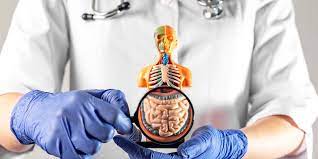It’s possible that your second brain is sending you messages if you’ve ever “gone with your gut” when making a decision or had “butterflies in your stomach” when you’re anxious. Within the walls of the digestive tract, this “brain in your gut” is transforming medical knowledge about the connections between mood, health, digestion, and even thought processes.
The brain’s chemicals and cells are used by this vast network to aid in digestion and notify the brain of any abnormalities, even though it is incapable of writing poetry or solving mathematical equations. The brain communicates with the gut all the time. The way we experience and perceive gastrointestinal (GI) symptoms and our overall quality of life are impacted by the significant crosstalk that exists between these two major brain areas.
Forget what you thought you knew about your gut. It’s not just a food processing plant – it houses a remarkably complex network of over 100 million neurons, a system so intricate that scientists have dubbed it the “second brain.” This network, known as the enteric nervous system (ENS), lines your entire digestive tract and plays a surprisingly multifaceted role in your physical and mental well-being.
Normally, when we see something tasty, the brain signals the gut to prepare for incoming food. When we feel anxious or stressed, we might experience these as abdominal pain, diarrhea, nausea, or “butterflies.” Messages travel from gut to brain, too. This helps explain why, when we eat something that makes us sick, we instinctively avoid the food and even the place we found it. These everyday activities can go awry when gut nerves are damaged or malfunction
How Does the Gut’s “Brain” Function?
The ENS works in tandem with your brain, utilizing many of the same neurotransmitters found in the central nervous system:
- Manages Digestion: The ENS independently controls the intricate processes of digestion, from muscle contractions to enzyme release and nutrient absorption.
- Communicates with the Brain: Your gut and brain are in constant dialogue via the vagus nerve, a major information highway.

- Influences Mood: Ever felt butterflies in your stomach or had a “gut feeling”? The ENS plays a key role in gut-brain communication, affecting emotions and potentially contributing to conditions like anxiety and depression.
- Impacts Immune Function: A significant portion of your immune system lives in your gut. The ENS helps regulate this crucial defense network.
The Gut-Brain Axis: Implications for Health and Well-being
Research into the gut-brain connection is exploding with exciting findings:
- Mental Health: Optimizing gut health through probiotics and a balanced diet might positively impact certain mood disorders.
- Gut Disorders: Conditions like Irritable Bowel Syndrome (IBS) seem strongly linked to imbalances in gut bacteria and communication between the ENS and the brain.
- Potential Therapies: Understanding the second brain opens avenues for treating conditions ranging from digestive ailments to neurological disorders.
Caring for Your “Second Brain”
Here’s how to support the health of this complex ecosystem:
- Eat a Balanced Diet: Focus on whole foods, fiber, and fermented foods that support beneficial gut bacteria.
- Manage Stress: Since the gut and brain are connected, stress reduction techniques can positively impact digestion and overall well-being.
- Listen to Your Gut: Pay attention to how different foods make you feel, it might offer clues about what your gut flora needs.
The Fascinating Frontier of Gut Science
The concept of a “second brain” might seem surprising, but it’s a revolutionary area of science. Unraveling the secrets of the enteric nervous system offers profound potential to improve not just our physical health, but our mental health as well. The next time you have a “gut feeling,” remember – it’s your “second brain” trying to tell you something!
What type of diet is good for my gut-brain axis?
A good rule of thumb to improve your gut health naturally is to eat a good variety of whole foods, emphasizing plants. More diversity in your diet leads to a more diverse gut microbiome, which is good for your overall gut health. Whole foods and plants also pack more nutrition per calorie than processed foods, leaving less room for harmful additives, sweeteners and saturated fats. Instead, they offer:
- Soluble and insoluble fiber. Most plants have both kinds of fiber, which help keep your bowels regular and feed the helpful microbiota inside. These microbes, in turn, nourish your gut lining.
- Prebiotics and probiotics. Probiotics are the live bacteria in fermented foods, like yogurt and sauerkraut. Prebiotics are the fibers and complex starches that these bacteria like to eat.
- Antioxidants. Antioxidants, which occur naturally in a variety of fruits and vegetables, help to fight free radicals in your body and prevent inflammation. Different foods have different types.
Anti-inflammatory foods. A whole-food, plant-rich diet is naturally anti-inflammatory because it reduces sugar, additives and cholesterol. This helps keep your gut microbes happy.


